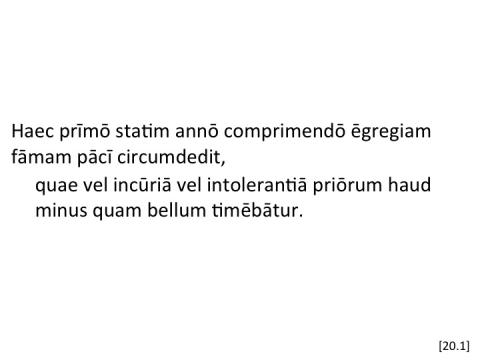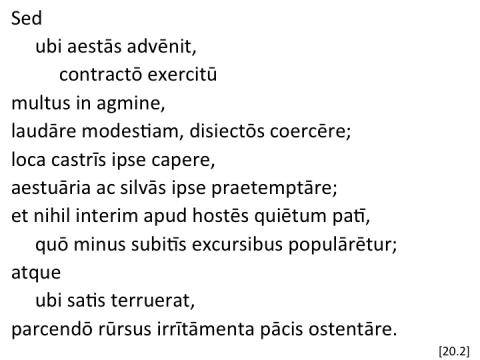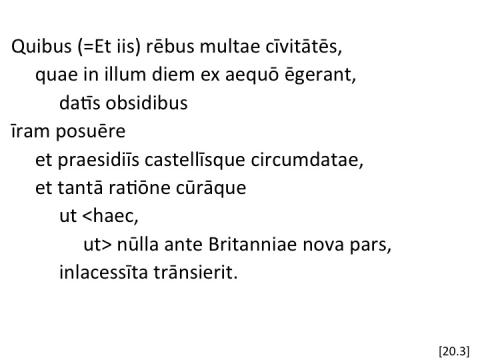Overview: Agricola adopts aggressive tactics in the campaign of the second summer, but by his clemency toward the conquered wins many states to allegiance. (Stuart); this chapter begins on f. 58r of the codex Aesinas.
20.1
prīmō statim annō: in the autumn and winter of 77 CE (for the date see Introduction) (Damon); prīmō statim occurs repeatedly in Tacitus ... . (Gudeman)
fāmam pācī circumdedit: the same metaphor occurs in Dial. 37.6. (Gudeman); literally, “he enveloped peace in a mantle of fair fame"; although it is difficult to say how far a Roman would feel the original force of the metaphor. (Stuart)
incūriā vel intolerantiā: refers respectively to governors who merely winked at oppression and those who actively practised it. (Pearce) intolerantiā: “want of self-control.” (Pearce); “intolerable insolence.” In this active sense, the word is comparatively rare. See Ann. 11.10.3. (Gudeman)
20.2
aestās: 78 CE (for the date see Introduction). (Damon) [INTXRF]
contractō: “mobilized.” (Stuart)
multus in agmine: as we might say, “he was everywhere in the line of march.” (Stuart); “he was continually with his troops on the march.” (Pearce); sc. adfuit. A Graecism first used by Sal. Jug. 96.3 in agmine ... multus adesse (sc. Sulla) and thereafter occasionally in other writers. (Gudeman)
modestiam: “discipline.” Notice Tacitus' love of variety in the use of the abstract here followed by the concrete disiectōs. (Pearce); = modestōs, the abstract for the concrete. In its military sense synonymous with obsequium, and opposed to discordia, here expressed by disiectōs, "stragglers from the ranks." Observe the chiasmus. (Gudeman)
ipse capere: this duty regularly devolved upon engineers, called mētātōrēs, who went in advance of the army. (Stuart)
aestuāria: sometimes taken as evidence that Agricola's operations during this campaign were in the west, where salt inlets are a feature of the topography. It is not safe to infer that Tacitus had a definite locality in mind. He is consistently indifferent to geographical accuracy and was primarily concerned with constructing an effective background for the central figure, Agricola. (Stuart); marshy regions near the sea and underwater at high tide. Unless the topography of Britain has undergone considerable changes, the present passage would indicate that Agricola's march was along the west coast. (Gudeman)
praetemptāre: “explored in advance,” a poetic and post-Augustan phrase … . (Gudeman)
et nihil = neque quidquam. Et before a negative, here in place of neque ūllīs, is perhaps more common in Tacitus than in any other Latin writer. (Gudeman)
interim: he was continually taking the offensive, even while he was engaged in increasing the efficiency of his army. (Stuart); “at the same time.” So frequently in Tacitus. (Gudeman)
quiētum patī: see Sal. Jug. 66.1 nihil intāctum neque quiētum patī. (Gudeman)
quō minus ... populārētur: we should expect quin after a negatived principal verb in this adversative sense. This use of quōminus or quin is derived from their use after verbs of hindrance. Agricola's action, expressed negatively in the principal sentence, is regarded as not hindering, and so as resulting in the action of the quōminus clause. This at least is the origin of such uses as the present, in which however the clause does not really express the result, but another aspect of the principal sentence. We should say, “he gave the enemy no respite, but ravaged.” (Pearce) [A&G 557-58] quō minus = quin, "but." A good instance of the idiomatic use of hypotaxis, esp. frequent with quōminus and quin, where we prefer coordination with an adversative conjunction. (Gudeman) populārētur: the absolute use of this verb is not uncommon in Tacitus, but as he never joins a personal object with it, we must supply in thought some phrase like hostium agrōs. (Gudeman)
rūrsus: “on the other hand.” So used in twenty other passages in Tacitus. (Gudeman)
irrītāmenta pacis: the genitive is subjective, as in the similar expression victōriae incitāmenta at 32.2. Irrītāmenta, the reading of the manuscript (see line 19 in the right-hand column), is often emended to more common but largely synonymous terms (see note below). (Damon) [A&G 343 note] incitāmenta: "incentives," used on the analogy of incitāmenta belli (Ann. 12.34.1). (Gudeman)
20.3
ex aequō: “on terms of equality” with the Romans. (Pearce)
praesidiīs castellīsque circumdatae, … ratiōne cūrāque: on the collocation of abstract and concrete nouns, a peculiarly Tacitean usage, see Introd. p. xxxiv, #1. circumdatae is used ἀπο κοινοῦ; in its proper sense with praesidiis, etc., figuratively with ratione, etc. see Introd. p. xxxii #6. On the medial position of the verb, see Introd. p. xxvi #3. (Gudeman) circumdatae: sc. sunt. Some editors excise the et which follows circumdatae or replace it with sunt (see note below for the reasoning). (Damon) circumdatae et tantā: a contraction of sunt to st may have been corrupted to et. (Pearce) et tantā ratiōne cūrāque: any general might locate fortresses in the enemy's country. The relegation of the ablatives to a separate clause connected by et emphasizes the fact that Agricola showed unusual tactical ability (ratiōne) in planning his lines. This praise is repeated in ch. 22.2 (Stuart)
ut <haec, ut> nulla ante ... pars, illacesita ... transierit: the addition of haec ut is one repair among many for the manuscript's garbled text here. It assumes that the scribe skipped from one ut to the next and dropped the intervening words. Haec refers to cīvitātēs but agrees with pars. The words ut nūlla ante Britanniae nova pars are parenthetical. A different repair adds pariter after pars (see note below). (Damon) pariter inlacessīta: "unmolested to a like degree," i.e. the Britons were not subdued in pitched battles, Agricola arriving at the same result by a conciliatory policy. See the passage above, (nihil ... ostentare). The verb seems to be a Tacitean coinage, and occurs again in Germ. 36.1. (Gudeman) illacessīta: "unassailed." Agricola's diplomacy and his skillful seizure of strategic points rendered recourse to arms unnecessary. (Stuart) trānsierit: see, for the use of transgredior, ch. 7.3, of a change in allegiance. (Stuart); viz. in dicionem Romanam. (Pearce); sc. ad Rōmānōs. For a similiar absolute use, see Liv. 26.12.6, ut quī cīvis ... trānsīsset (of deserters). (Gudeman)



